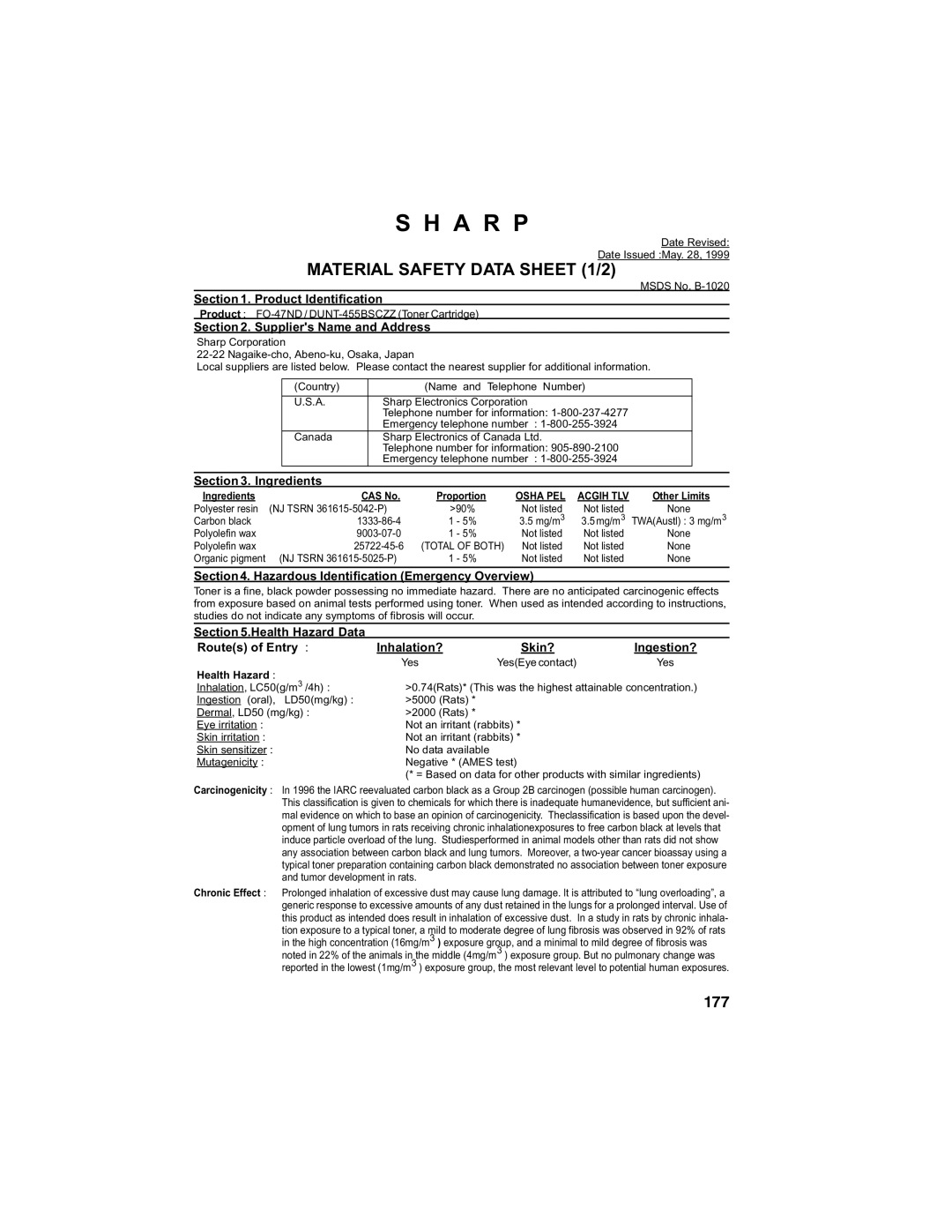
S H A R P
Date Revised:
Date Issued :May. 28, 1999
MATERIAL SAFETY DATA SHEET (1/2)
MSDS No.
Section 1. Product Identification
Product :
Section 2. Supplier's Name and Address
Sharp Corporation
Local suppliers are listed below. Please contact the nearest supplier for additional information.
| (Country) | (Name and Telephone Number) |
|
|
|
|
|
| U.S.A. | Sharp Electronics Corporation |
|
|
| Telephone number for information: |
|
|
| Emergency telephone number : |
|
| Canada | Sharp Electronics of Canada Ltd. |
|
|
| Telephone number for information: |
|
|
| Emergency telephone number : |
|
|
|
|
|
Section 3. Ingredients
Ingredients | CAS No. | Proportion | OSHA PEL | ACGIH TLV | Other Limits |
Polyester resin | (NJ TSRN | >90% | Not listed | Not listed | None |
Carbon black | 1 - 5% | 3.5 mg/m3 | 3.5 mg/m3 | TWA(Austl) : 3 mg/m3 | |
Polyolefin wax | 1 - 5% | Not listed | Not listed | None | |
Polyolefin wax | (TOTAL OF BOTH) | Not listed | Not listed | None | |
Organic pigment | (NJ TSRN | 1 - 5% | Not listed | Not listed | None |
Section 4. Hazardous Identification (Emergency Overview)
Toner is a fine, black powder possessing no immediate hazard. There are no anticipated carcinogenic effects from exposure based on animal tests performed using toner. When used as intended according to instructions, studies do not indicate any symptoms of fibrosis will occur.
Section 5.Health Hazard Data
Route(s) of Entry : | Inhalation? | Skin? | Ingestion? |
Health Hazard : | Yes | Yes(Eye contact) | Yes |
|
|
| |
Inhalation, LC50(g/m3 /4h) : | >0.74(Rats)* (This was the highest attainable concentration.) | ||
Ingestion (oral), LD50(mg/kg) : | >5000 (Rats) * |
|
|
Dermal, LD50 (mg/kg) : | >2000 (Rats) * |
|
|
Eye irritation : | Not an irritant (rabbits) * |
| |
Skin irritation : | Not an irritant (rabbits) * |
| |
Skin sensitizer : | No data available |
|
|
Mutagenicity : | Negative * (AMES test) |
| |
| (* = Based on data for other products with similar ingredients) | ||
Carcinogenicity : In 1996 the IARC reevaluated carbon black as a Group 2B carcinogen (possible human carcinogen). This classification is given to chemicals for which there is inadequate humanevidence, but sufficient ani- mal evidence on which to base an opinion of carcinogenicity. Theclassification is based upon the devel- opment of lung tumors in rats receiving chronic inhalationexposures to free carbon black at levels that induce particle overload of the lung. Studiesperformed in animal models other than rats did not show any association between carbon black and lung tumors. Moreover, a
Chronic Effect : Prolonged inhalation of excessive dust may cause lung damage. It is attributed to “lung overloading”, a generic response to excessive amounts of any dust retained in the lungs for a prolonged interval. Use of this product as intended does result in inhalation of excessive dust. In a study in rats by chronic inhala- tion exposure to a typical toner, a mild to moderate degree of lung fibrosis was observed in 92% of rats in the high concentration (16mg/m3 ) exposure group, and a minimal to mild degree of fibrosis was noted in 22% of the animals in the middle (4mg/m3 ) exposure group. But no pulmonary change was reported in the lowest (1mg/m3 ) exposure group, the most relevant level to potential human exposures.
177
